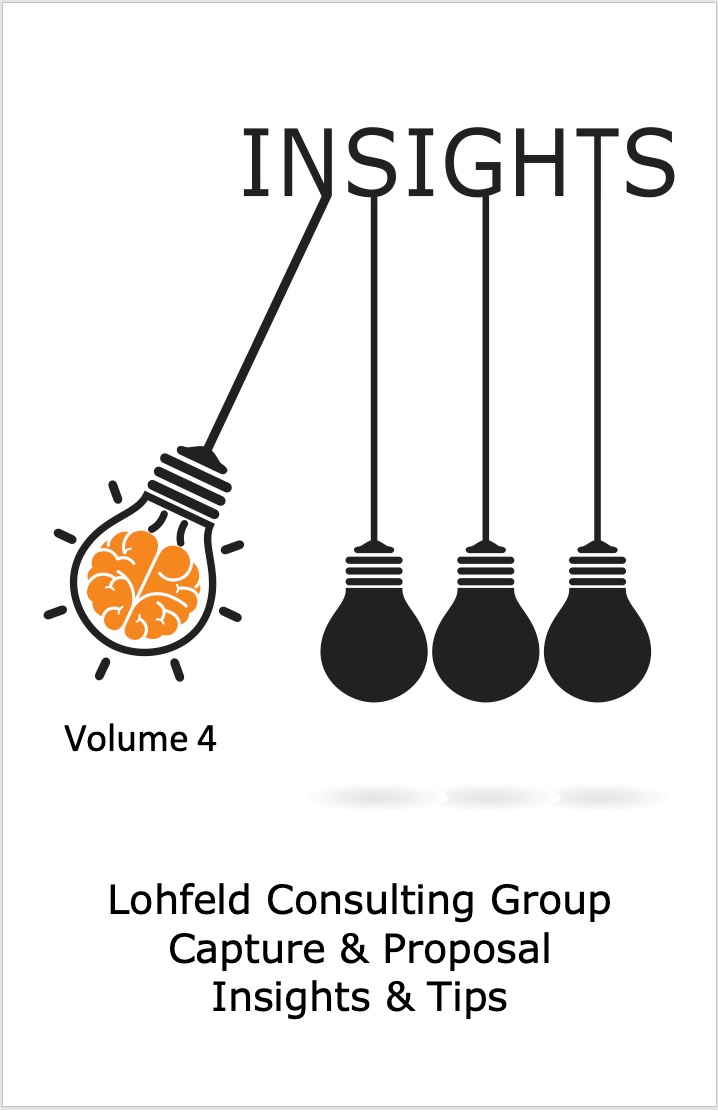Winning “must win” deals
 “Oh, by the way, this is a must win deal for us,” my boss said as we concluded our conversation. The RFP had dropped, and I was to lead the final proposal effort. The company was getting ready to graduate from the small business world. Like many, we were looking to win as many small business IDIQ vehicles as we could to cushion our transition. The opportunity fit within our core competencies—but with an agency and government sector new to us. While there had been some pre-RFP activity and team building, it was focused on smaller companies familiar with the sector, but not with the agency.
“Oh, by the way, this is a must win deal for us,” my boss said as we concluded our conversation. The RFP had dropped, and I was to lead the final proposal effort. The company was getting ready to graduate from the small business world. Like many, we were looking to win as many small business IDIQ vehicles as we could to cushion our transition. The opportunity fit within our core competencies—but with an agency and government sector new to us. While there had been some pre-RFP activity and team building, it was focused on smaller companies familiar with the sector, but not with the agency.
My work was cut out for me!
Carefully considering the situation, I determined we needed to do three things to win:
- Fully understand the customer’s needs, not just their requirements.
- Propose a strong solution to meet both the requirements and the needs.
- Build in time for quality reviews and recovery.
Customer requirements and needs
The term requirement can have multiple meanings, from an unmet or evolving mission need to the specifications of a contract, which is what an RFP expresses. RFP requirements are the government’s concept of the solution to that larger type of requirement—the mission need. Beyond the stated requirements are challenges and struggles the agency might have in their current situation, or additional goals they dream of achieving.
Capture is a great way to understand these larger needs and to align them with the contract requirements. Even if you haven’t had the opportunity to do the full scope of capture activities, you can still do some research to learn about these. That research should also include what the RFP has to say.
For example, in my story, the RFP’s past performance requirement called for up to 10 citations, but only half could come from subcontractors. Cited contracts were for work ongoing or completed in the past 3 years and valued at or over $10M—a steep climb for smaller firms. Fortunately, we had eight qualified potential citations. We concluded the government was concerned about the ability of smaller companies to successfully manage multiple large task orders. This became a key theme for our proposal. It also showed us that we needed to find some large businesses who were in the sector or at the agency and convince them to join our team. A strong marketing blitz focused on this requirement, and our solution eventually enticed a key large business to join us, bringing their originally planned (and respected) small business partner.
Building strong solutions that meet the requirements and needs
Proposals built in a best-value environment need to be chock full of strengths—the key to a successful evaluation. A strength is a feature of your proposal that a reviewer recognizes exceeds the requirements of the RFP in a way that is beneficial to the government. Simply demonstrating you can perform the requirements is not enough in a must win situation. It only means you meet the requirements. You need to show how your solution goes beyond. When you can link your features (that satisfy the requirements) to resolving the larger needs, you will have a stronger proposal. Be sure to support your claim with facts (e.g., past successes, performance versus baselines, etc.) and share how it will benefit the agency. Don’t trust the reviewers to figure it out. Make it easy for them.
As you plan the proposal, identify strengths for every section. In my example, we had a clear path to strengths in Past Performance and Management. Our large business partner identified a number of technical strengths built on their knowledge of technical tools and processes important to the agency. They included examples based on their past successes at that agency.
Making time for quality reviews and recovery
After planning your must win proposal, test its strength through regular reviews that focus on its quality. Winning proposals are a group effort, which is a strength and a challenge. You must keep the group focused while not falling victim to groupthink and failing to see your weaknesses.
In software development, whether Agile or Waterfall, early and regular reviews catch erroneous assumptions and fundamental errors sooner, making delivered products stronger. The same is true for proposals. Early reviews should focus on compliant structure and responsive content. As the proposal matures, the focus shifts to customer focus and compelling content. Your proposal should be easy to evaluate and communicate effectively through graphics as well as text.
When the government reviews your must win proposal, they will be using a checklist based on the evaluation criteria and the proposal preparation instructions. Develop your own checklist and test if the required responses are easy to find in your proposal.
In my example, we reviewed the outline and our target list of strengths early and then had several layers of reviews. We developed checklists for each review to guide our process. Critically, we engaged our reviewer cadre early, gaining critical feedback at each phase, focusing on our assumptions and on the proofs for claims made. These reviews helped us to avoid falling in love with our work and made sure we addressed the elements of our solution that would score well with the agency.
Our hard work resulted in a compelling proposal. We demonstrated our company was an effectively run small business that could handle the rigors of producing high-quality work on multiple, simultaneous task orders. We also demonstrated our ability to partner with and supervise firms that had a deep understanding of the agency’s mission and goals using tools and processes familiar to the agency and adaptable to future needs. In the end, our company won that must win contract, gaining us entry into a new market sector and further opportunities to grow.
Dwayne Baptist, Managing Director at Lohfeld Consulting Group
Dwayne brings 30 years’ experience in the information technology and service delivery sector, with 25 years’ experience in capture and proposal development. An expert Proposal Manager, Orals Coach and Color Reviewer, he is a preeminent proposal strategist and solution architect. He has worked across off of DoD, many parts of DHS, and numerous civilian Federal Agencies. He has also led proposal efforts at the state and local level.
Prior to joining Lohfeld Consulting Group, Dwayne has served in senior leadership roles in a variety of large and small companies. He has led efforts to win major IDIQ vehicles with ceilings as high as $10 billion, including assembling winning teams to enter new markets that subsequently won significant task order revenue. As president of Dwayne Baptist and Associates, he combined capture and proposal development consulting with executive coaching to help leaders and organizations develop the business processes needed to quickly and reliably capture, bid, and win new work, and to protect incumbent work.
Lohfeld Consulting Group has proven results specializing in helping companies create winning captures and proposals.
As the premier capture and proposal services consulting firm focused exclusively on government markets, we provide expert assistance to government contractors in Go-to-Market Strategy, Capture Planning and Strategy, Proposal Management and Writing, Capture and Proposal Process and Infrastructure, and Training. In the last 3 years, we’ve supported over 550 proposals winning more than $135B for our clients—including the Top 10 government contractors. Lohfeld Consulting Group is your “go-to” capture and proposal source! Start winning by contacting us at www.lohfeldconsulting.com and join us on LinkedIn, Facebook, and Twitter.
Paperback or Kindle
10 steps to creating high-scoring proposals
by Bob Lohfeld
contributors Edited by Beth Wingate
Subscribe to our free ebrief
Teaming friends, frenemies, and enemies—12 tips to mitigate harmful effects
Did you know that contracting officers spend up to 20% of their time mitigating disputes between teaming partners? In an informal poll we conducted on LinkedIn last month, 40% of respondents classified their teaming partners as “frenemies” on their last bid.
Explore Further
- Advice (445)
- AI (5)
- APMP (17)
- Business Development (197)
- Capture Management (196)
- Favorite Books (5)
- Go-to-Market (27)
- Graphics (6)
- Lohfeld Books (3)
- Past Performance (58)
- Post-submission Phase (15)
- Pre-RFP Preparation (210)
- Proposal Management (269)
- Proposal Production (60)
- Proposal Reviews (27)
- Proposal Writing (77)
- Pursuit Phase (89)
- Research Report (2)
- Resources (60)
- Tools & Tips (258)
- Training (10)
- Uncategorized (220)

Sign Up for INSIGHTS and Download your FREE book
We'd love to help you with your proposals. Enjoy our complimentary Lohfeld Consulting Group Capture & Proposal Insights & Tips book with your FREE subscription to our Insights Newsletter.
GET YOUR FREE BOOK




